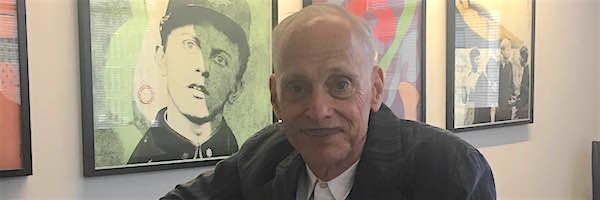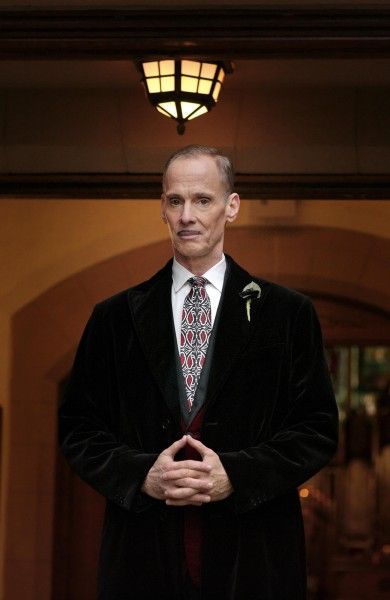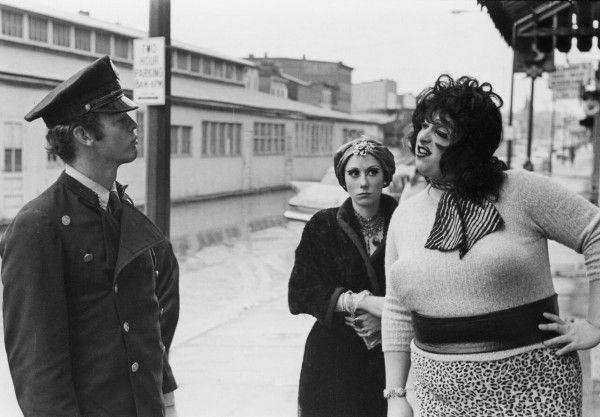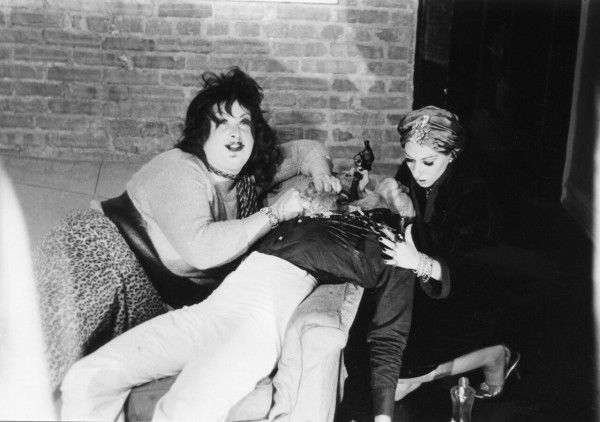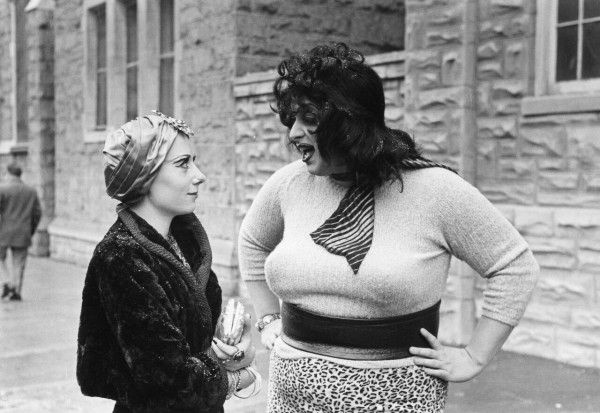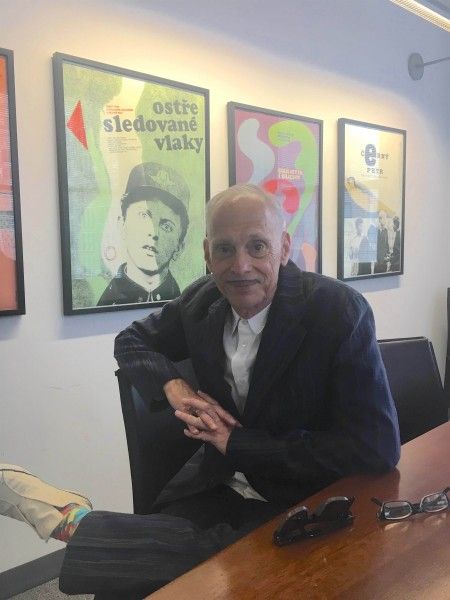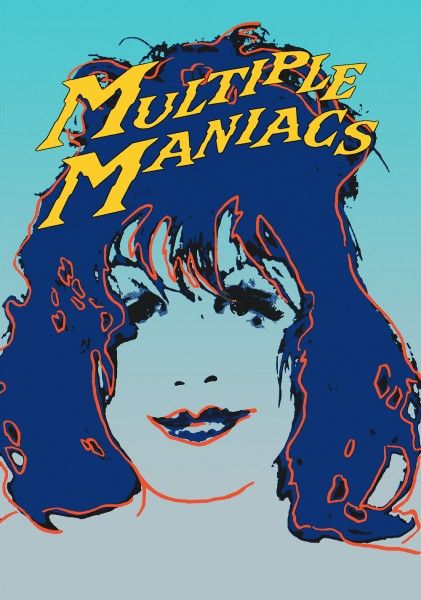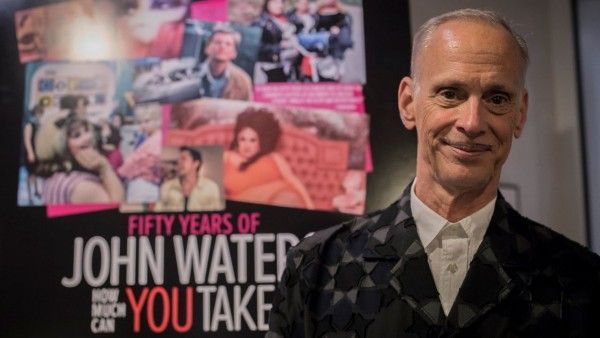John Waters is one of the few filmmakers that nearly everyone – inside and outside of the film industry, might recognize. Between the carefully tailored striped suits and pencil-thin, Little Richie-inspired mustache carefully drawn on his upper lip, the filmmaker has crafted a public persona as unmistakable as his oeuvre. Making underground films with other talented Baltimore misfits at a nearly prodigiously young age with shorts and then early feature-lengths like the dialogue-free mondo movie satire Mondo Trasho, Waters didn’t break out into the relative mainstream until his rebelliously over-the-line Pink Flamingos introduced both his frequent collaborator Divine (who famously ate dog excrement for the role) and his own gleefully tasteless approach to genre and pastiche to the world. Since then, Waters has become somewhat of a cult superhero, a charmingly articulate voice for the country’s self-professed weirdos and misfits, with his affinity for stylish counter-culture and the out of vogue.
Despite crossing into the mainstream long ago with his widely-adopted Hairspray, Waters’ early work is still the subject of most obsession, and thanks to a recent collaboration with Criterion and Janus films, his second feature length (and the first of his to feature dialogue), Multiple Maniacs, has just received a top-to-bottom restoration that turned the previously beaten-up midnight movie into something that Waters thinks resembles “a bad Cassavetes film.” Multiple Maniacs, which has a plot loosely tied together by the criminal activities of Divine and her gang of thieves, begins with a Cavalcade of Perversion (perhaps an alternative title for most of Waters’ career?), that boasts attractions like puke-eating and armpit-licking – and things don’t get any less inflammatory from there, with the film including a highly explicit sex scene in a church and a narrative climax that involves Divine being raped by a massive lobster known as “Lobstora”. To describe the film, of course, is to in no way correctly represent it – so lest you feel off-put by that simplistic synopsis, know that you can only know what a Waters film is by seeing it for yourself.
I had a chance to speak with Waters the night before the restoration’s premiere at New York City’s IFC Center, where we talked about the film’s humble behind-the-scenes secrets, how the film has changed in today’s political climate, and his potential future on television.
So how did you and Janus/Criterion decide on Multiple Maniacs? It’s certainly not the obvious choice out of your filmography.
JOHN WATERS: I definitely picked it because technically all the other ones were in distribution, and this one was not, it’s been out of distribution for nearly 20 years so I really wanted to get it out of jail. But I had no idea that they could restore it and when I saw it, I was just amazed, it seemed so new. So, yeah, I always wanted this to happen because I realized – I’m 70, if eventually I dropped dead and it hadn’t been worked out because of all the music and everything it would never have come out again. So now, it looks exactly the way I wish it had looked in 1970.
I was going to ask, that bootleg quality has been part of the film for so long, does the new, cleaner look change the way you look at it?
WATERS: I mean I always liked it because I always liked it because it was the first movie we could talk in, that I could write dialogue for. And I wrote too much dialogue, but I always liked it. But the way it looks now with the new restoration, you can hear it again, you can see things you never saw before. It made it easier to watch and I’m happy about that. I always want movies to be easy to watch even if it’s the most difficult subject matter. Even Derek Jarman’s Blue, it was just the color blue, but it was filmed well, the blue. [laughs] So, I think that was important to me. If we’re going to ask people to come see a movie again, especially if they haven’t seen it or it’s been 30 years and they don’t remember, let’s make it – because the movie is rude enough, so if you make it look arty and beautiful enough, it makes it even better. Because then it’s more confusing.
What do you see when you watch the film now, what sticks out?
WATERS: I mean, I look at it and I see my parent’s house in the background, the one we grew up in. That’s the Cavalcade of Perversions, that is their house. My brother, unfortunately is dead, from a brain tumor, he’s in it. So I see things like that. People… Many, many people who are no longer with us are in it, so I’m very glad to see them on film!
If I’m not mistaken, your father helped fund this film. Though, I know you paid him back.
WATERS: Yes, I paid him back! But no. He was horrified. That was the thing, they were horrified but supportive. And that really is, when you think about it, very loving. I did pay them back, I am a weird gay version of my father, in a way. He taught me to be fiscally responsible, he taught me to run a business. But the product is very different than he would have ever considered selling. Or he didn’t even know about that product. And, to the end, wished he didn’t. [laughs]
This film sort of lays out what it’s about – and it’s rather unconventional – right away. Was it at all difficult to get audiences to come out to see it?
WATERS: It wasn’t hard to get people to come see it, we had our premiere in the church. We would put fliers in restaurants, walk in a bar where people were eating and put the flier in front of them. And the campaign was “You won’t believe this celluloid atrocity! Lady Divine,” and yeah. We sold out, it played for one weekend, three shows a night and it sold out. But I always did that, to get the reviews, which were always horrible but then we used in the ad. The bad reviews. And then to get some kind of national attention that would hopefully allow us to book it elsewhere. Which worked slightly. And then I would go around the country to book things. And I certainly went to San Francisco, and I worked with this man named Sebastian with The Cockettes and everything, and he booked a lot of Multiple Maniacs and Mondo Trasho and so did a man from Underground Cinema 12, Mike Getz, who’s still alive and I owe him a lot because he got me the national exposure where it played in Los Angeles and things like that. And then it just didn’t play for 20 years. When Pink Flamingos finally became a hit in New York, Multiple Maniacs had never shown in New York. I think New Line managed some midnight screenings but it never really had – it had a pitiful release on VHS and then a pirate release which I still stop on Ebay because the MPAA caught them in a garage making copies. And I thought, of all the films to pirate? Why don’t you do E.T. or something?
That would be where the real money is! Can we talk about all the Manson talk in the film? I know this is a lifelong interest of yours.
WATERS: When Multiple Maniacs was made, no one knew who Manson was, including me. The plot sort of was that Divine had tricked her husband into believing that he had committed the murders. They hadn’t even caught Manson. So then, there’s a scene where they look them up in the newspaper, that was that day. And they go, “who are these people?” I had to put that in so it would make sense so even then no one knew that that was going to be a famous case, so that was filmed at the exact time, or right after. It’s uncanny in a way. There were all kinds of “multiple maniacs” going on at the same time. But we were doing it for humor, nobody was ever hurt in any way. We got rid of all of our antisocial behavior on film which is very different than doing it in real life. And by the time that they committed the crime, I’m not sure they thought they were in the real world either.
This is, really, a political film at heart. How do you think it’s changed to play in today’s political climate?
WATERS: It’s weird to see now in this political climate because they talk about killing cops all the time, which I’m certainly not for. But at the time, it’s so bizarre because the Black Panthers were saying “off the pigs,” it was normal. But today, it’s not normal to say that. It’s not normal for any group to say that. Except crazy people that go shoot cops. So basically it makes you more uncomfortable now, but I think the reason it is playing as well as it is is that you know that it was made almost 50 years ago. It’s playing in this time warp. So today if that movie was made with that? It would uncomfortable and maybe not so funny, but I think because it was made in a completely different time, a completely different era it’s more bizarre in a way. Because you can’t say it’s politically correct because it’s not for today. It was hippily incorrect, the Hippie movement, but that’s who came to see it and that’s who wanted to be made fun of. And punk came next. And it was certainly a movie that was more punk. It was an exciting time because things were radically changing. You think today, you look at the news and there was 500 things happening. Then there were 500 things happening, but it was much more extreme! The president’s resigning, this place is blowing up. People really did believe that the revolution was coming.
And now?
WATERS: I don’t think even the Black Lives Matter people, who – I supported DeRay Mckesson for mayor of Baltimore, I don’t even think they think a revolution is going to happen. But I think in those days they did! It’s almost comical to think about the fact that The Cockettes used to sit there in drag reading Lenin. I don’t think drag queens today read Lenin. Maybe they were learning for fashion, I don’t know.
And in terms of all the sort of blasphemous, religious elements was that ever trouble for you?
WATERS: They didn’t even know about it. When the censor board lady finally saw it in 1980 because she was going to play it in a theater, she went crazy because she was a Catholic. Catholics didn’t even know about it. I used to say to Willem Dafoe, when he was doing Last Temptation of the Christ, “you think that’s bad, you oughta see the rosary job! You think people are flipping out, wait until they see that!” And I don’t think today, how many radical Catholics are going to come see this movie? Maybe William Donohue, the head of the Catholic League? He’s the Fred Phelps of the Catholic church. He’s come out against me, I hope he sees it.
I have to ask about Lobstora. Obviously, one of the lovely things about Multiple Maniacs is somehow still shocking, but I think especially that scene, people still don’t know what to do with that.
WATERS: Well that’s from Theater of the Absurd. Nobody talks about that movement, which came before this movement in the early ‘60s and it was a huge influence on me. That’s where it came from. And also from surrealism and in Cape Cod, in Provincetown there were postcards everywhere with a broiled lobster up in the sky on the beach and we were all, “ah! It’s coming to kill us!” You know, we would be high, joking about it. But I think Theater of the Absurd, which later became Theater of the Ridiculous was that something had something that made no sense in the middle of it. But it did make sense to me, she had just killed everybody, she was losing her mind, she had gone over the edge of insanity, then a lobster rapes her, and then she turns into a true monster who’s gunned down by the national guard, so to me it makes perfect sense. But it’s a good thing we didn’t have test screenings then. I can see the focus groups saying, “well why did the lobster come?” And then the studio would make give a reason.
This was the first film you got to sort of script, and use sync sound.
WATERS: Yes, that’s why there’s so much dialogue. And they’re screaming to make sure you can hear it.
And I know you had sort of worked with Divine and Mink [Stole] and the rest before, but this was the first time they all got to talk!
WATERS: Yes, I had made Eat Your Makeup and Mondo Trasho, I’d made all of them so they had been in stuff before, but it was our big budget movie at the time. Edith [Massey] always had trouble with lines. To the end of her life she had trouble with lines and she would write them over and over. You can see her trying to remember.
There’s this one very long take that Divine is just monologuing for the entire time and I was so impressed.
WATERS: Then he’s like, you can tell he’s trying to remember his next line, turning his head, “you’re a maniac now…” sitting there. I just remember, we would just jump out. The scene that makes me laugh the most is the scene where they’re escaping that cavalcade in the old white Cadillac and they’re driving, and it pulls over and parks. Well, the car died. That was in the projects in a parking lot. They just got out, and abandoned the car, we never went back. But it’s on film!
Well, the good thing is you never would have known. Since we are in the Janus offices, I feel that I should broach the concept of “art film” with you.
WATERS: Oh, yes! I love Janus, the first art films I ever saw: Godard, Bergman, and I knew when that logo came up on the screen, it meant high-brow, and also unconventional. I would be sipping my espresso coffee down in the art theater, sneaking from my suburban area to go downtown to see a foreign film it was everything that I wanted, Janus films. The very fact that they’re distributing it is in some ways ironic but some ways not. Because I always joked I wanted to make exploitation films for art theaters. And well, it’s opening in an art theater.
You’ve always kind of said that your movies don’t play well with exploitation audiences.
WATERS: Well there’s no such thing anymore. There’s no grindhouse in New York. There’s no exploitation movies. Well, I guess there is, Piranha 3DD is one, but there’s not theaters that specialize in them. They don’t have out front, “Come in! See it today!” like the Cavalcade of Perversion. But when there was, I always wanted our films to play there.
What is it like watching this film with like current audiences?
WATERS: Seeing this movie with an audience is worth it because I like to see young people’s reactions. The one time I’ve seen it, they were like, “huh? What were you thinking about?” Which is a fair question. Because I look at it and think, “why did I have that guy shooting heroin at the altar?” There’s no reason for that and it’s overkill and I shoulda cut it out but it’s still in there. And he was doing it for real.
It’s so fascinating because I feel as though you’re this omnipresent part of people’s like art education, especially young people – why do you think these films are so accessible to young people so far on?
WATERS: Well that’s great, that I’m getting a younger audience. But I think that hitchhike across the country, what 66 year-old man does that? But I think that’s because I’ve always believed that the next culture is going to do something even better than the last. I don’t think “oh, things were so much better in the ‘60s.” No. I mean, you can’t imagine some of the stuff that happened, everyone had sex with a different person every night – that will never happen again in my lifetime. And it only happened for about five years. But still, I’m glad I saw that and the fact that there was a revolution happening in the streets. You saw a little bit of that happening, a little of that’s happening now, but you don’t really feel like the whole country might collapse.
We still have an election!
WATERS: With Trump… No, I think he’ll just quit. And just leave anarchy.
I could see that happening.
WATERS: Me too. I’m tired of him. Or I could see his Vice President quitting before the election. But then he’d be done because he gave up being Governor of Indiana to do that, didn’t he?
To just have to go sit on a couch would be something. This is vaguely related, but how are you sort of feeling about the future of indie film right now? It’s tough. At least in America.
WATERS: They are getting made in Europe because the government pays for them to get made. And can you imagine the government paying to make Multiple Maniacs? No, they’d pay to stop it. But, the most radical filmmakers you can think of in Europe, the government pays for their films. That’s a brilliant idea, but it will never happen in America.
Now, you didn’t go to film school, you were at NYU for a very brief amount of time –
WATERS: Yes and I was thrown out of the dorm, I wasn’t actually expelled but I was thrown out of the dorm and told I needed extensive psychiatric treatment. But just recently, I went back in, to Joseph Weinstein dorm, I went in there for the first time and it was so weird. It wasn’t really NYU’s fault, I only went to one class. I used to steal books in the bookshop and then sell them back later in the day to get money to go see movies every day in Times Square, art movies and hideous movies. My parents were horrified. And on the way home, I’d be jumping out of the car like Diane Linkletter, “no! I want to stay in New York!” It was very melodramatic. And my parents, when they look back on it, they were frightened. They thought if you smoked pot, you were a drug addict. But my friend, Todd Solondz, teaches at NYU so I have nothing against the school. But, if I had been there, I don’t believe they would have allowed me to make Multiple Maniacs. But today, as I’ve said before, you could make a snuff movie as long as you gave a trigger warning. [laughs]
If that wasn’t your film school, was your film school in the movie theater?
WATERS: No, my film school was Pete Garry who ran Quality Film Labs in Baltimore and another man who would make deals to get me the equipment from TV stations, I think sometimes they didn’t know the equipment was leaving there and it would be like teamster types that would show me how to work it and they would be there on set. That was my film school. They taught me. And who knows, the movie’s playing isn’t it?
I do want to ask, I know things have sort of fallen through in the past with your film projects which is why you’re focusing on your writing career. But if the industry isn’t in sync with you right now, have you thought about TV?
WATERS: Sure! I think TV’s better. Now TV is so much better than independent film. Of course I would, in a minute. I’m not against television at all. I think what’s on it is the best it’s ever been.
Well we’ve gotta put you in contact with someone, then.
WATERS: Sure!
Multiple Maniacs will screen at the IFC Center in New York the week of Aug. 5-11. The Criterion Collection home release does not currently have a release date.

